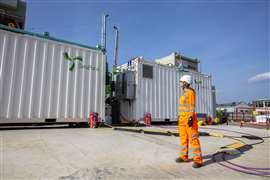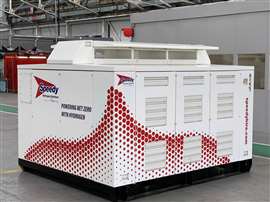Read this article in Français Deutsch Italiano Português Español
Hydrogen fuel cell power units gain traction on construction sites
06 February 2025
At a construction site in West London in the UK, two white shipping containers stand out among the cranes, equipment and personnel at work on the site. The location is called the HS2 Victoria Road Crossover Box site, and it is part of a new high-speed railway that will connect London with Birmingham.
The humming sound coming from both shipping containers betrays their purpose to those in the power industry: they provide electric power to the site via emissions-free hydrogen fuel cells.
 GeoPura HPUs deployed at the HS2 site. Photo: GeoPura
GeoPura HPUs deployed at the HS2 site. Photo: GeoPura
Hydrogen fuel cells have found their way into a variety of vehicles and equipment, from buses and trucks to trains and material handling equipment. Because their only emissions are water vapor, fuel cells are attractive for OEMs looking to decarbonize.
Now hydrogen fuel cells are making inroads in the construction industry. XCMG, for instance, introduced a fuel-cell-powered dump truck last June. Additionally, Hyundai Construction Equipment said it planned to present a fuel cell electric excavator at the upcoming Bauma 2025 trade show. One key application, however, is as a replacement for the traditional diesel-fueled generators often used to provide supplemental power on job sites.
Clean Energy Transition
The hydrogen power units (HPU) at the HS2 Victoria Road Crossover Box site are made by clean energy company GeoPura based in Newcastle, England. The company was launched in 2019 with partner Siemens Energy Ventures.
Matt Barney, chief hydrogen business officer for GeoPura, said that continuing to live and work as we have will require significant amounts of fuel.
“Ultimately, if we’re going to wean ourselves off fossil fuels, then zero-emissions fuels have to play a part in that spectrum,” he said. “We need to start supporting more energy-hungry applications, whether that be in construction or for data centers, and so we need a fuel as part of that mix.”
 Matt Barney, chief hydrogen business officer at GeoPura. Photo: GeoPura
Matt Barney, chief hydrogen business officer at GeoPura. Photo: GeoPura
GeoPura rents its HPUs for use in a variety of applications, including construction, live events and even television and film production. In addition to the HS2 Victoria Road Crossover Box location, GeoPura HPUs are in operation at two other HS2 sites in Aylesbury, England. Other UK customers include utility provider National Grid, contractor BAM Nuttall and infrastructure group Balfour Beatty.
Barney said GeoPura is focused on scaling its business. “We’re interested in how we get from the steppingstone baby steps we’re still taking and building on that commercial model to start to fill that gap to do even more. We’re hardly scratching the surface, really.”
To that end, February 2024 saw GeoPura secure $71 million in funding from investors such as the UK Infrastructure Bank and Barclays Sustainable Impact Capital. The company also raised another $28 million in debt funding last September. That money will be used to grow GeoPura’s fleet of HPUs to 3,600 by 2033, the company said.
GeoPura also manufactures its own hydrogen at sites across the UK, and the company said some of that funding will help expand its production capacity. GeoPura said it produces about six metric tons of green hydrogen per week at its Nottinghamshire and Yorkshire sites, which it delivers to HPU customers via a fleet of 80 tankers. Barney said GeoPura hopes to have even more sites throughout the UK.
“We’d like to see a whole network of small-scale electrolyzers in the short to medium term,” he said. “But we’re very much aware of what other players are doing in this space, as well, with much larger projects.”
The HPU Landscape
GeoPura is not alone in its mission to deploy HPUs. EODev is a French spin-off from the Energy Observer floating laboratory, the world’s first vessel able to produce decarbonized hydrogen from seawater. EODev sells its GEH2 power units to customers such as rental companies United Rentals, Loxam and Kennards Hire.
 An AFC Energy fuel cell genset in the colours of rental partner Speedy Hydogen Solutions, (Photo: AFC Energy)
An AFC Energy fuel cell genset in the colours of rental partner Speedy Hydogen Solutions, (Photo: AFC Energy)
Then there is AFC Energy, based in the UK, which said it had $33.5 million worth of orders for its 30kW HPUs in 2024. This included orders from global contractor Acciona as well as a sales agreement with Middle Eastern heavy industry distributor TAMGO. AFC Energy also has supply arrangements for its 50/50 joint venture with Speedy Hire.
Many traditional equipment OEMs are also capitalizing upon interest in such products. In April 2024, for instance, Hitachi Energy announced a partnership with Swedish fuel cell system maker PowerCell Group to develop the Hyflex hydrogen fuel cell gen-set.
Later in July, Yanmar Energy Systems announced a fuel cell power generation system. The company said it started taking orders for the system in September.
Finally, Caterpillar recently announced a collaboration with Microsoft and Ballard Power Systems to validate the use of hydrogen fuel cells as backup power options for data centers.
Barriers to Adoption
The adoption of hydrogen equipment is often hampered by the availability of fuel. 2024, for instance, saw the failure of many projects around the world aimed at producing green hydrogen.
Additionally, hydrogen fuel cell-driven equipment tends to be a chicken-and-egg story. Hydrogen producers are reluctant to increase capacity because they are uncertain of the market size, while OEMs are hesitant to build fuel cell-driven machines because they worry about the availability of fuel.
As discussed, GeoPura gets around this by producing its own green hydrogen. Nonetheless, barriers to adoption remain. One such hurdle is cost.
According to GeoPura’s Barney, the cost of running a diesel generator on a construction site is about $2.04 per liter compared to an equivalent cost for hydrogen at $2.96 per liter. Contractors are sensitive to these fuel costs, as they compound the cost of renting the HPUs themselves.
Despite this, Barney said interest in hydrogen fuel and HPUs is slowly growing.
“One hundred years ago, there were no gas stations in this country,” he said. “But within a very short period of time, there was a petrol station on virtually every corner, in every street, every community. There was a tipping point that came where people needed that energy requirement.”
Barney added that the GeoPura model allows the company to more effectively commercialize hydrogen so that it can continue to develop the infrastructure and supply chain.
POWER SOURCING GUIDE
The trusted reference and buyer’s guide for 83 years
The original “desktop search engine,” guiding nearly 10,000 users in more than 90 countries it is the primary reference for specifications and details on all the components that go into engine systems.
Visit Now
STAY CONNECTED




Receive the information you need when you need it through our world-leading magazines, newsletters and daily briefings.
CONNECT WITH THE TEAM













